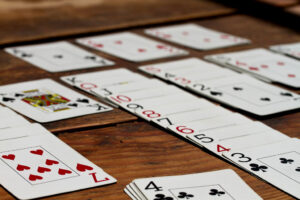Not too long ago, I was asked whether there were any games which I thought were Satanic, which Christians should avoid. If you’ve read this series to date, you know my answer; but perhaps this time I have a different answer, a surprising answer. For from my personal experience, I can suggest that there is a game which Satan uses against me, to tear me down and pull me away from God. And so from my own experience I would be justified in saying that this is a game which Christians should not play, or at least should give careful consideration to the dangers before doing so.
The game is Solitaire.
Before you turn away, hear me out. There are dangers to this game that you have never considered. It has nothing to do with cards or games of chance per se, but with something deeper, something which Satan can use to undermine your faith if you are not careful.
To play the most popular variant of this game (in case you are somehow unfamiliar with it) you need an ordinary deck of playing cards, what is commonly referred to as a Poker deck or Bridge deck, with no jokers. You lay twenty-one of these cards face down on the table in six piles, each one card smaller than the one to its right, from six down to one hidden cards, and then place one card face up on each pile, and a single card face up to the left of all. The rules then permit you to move cards as follows: a red card may be picked up and placed on top of a black card one number higher, and a black card may be placed on a red card in the same manner, such that in any pile of cards so created all the even-numbered cards will be one color and the odd-numbered ones the other. If in moving a card you expose one of the hidden card piles, you may turn the top card in that pile face up, and so bring it into play. If you create an open space where one of the initial seven visible cards was, any King may be placed in this space. The royal cards are treated as eleven, twelve, and thirteen, that is, Jack, Queen, and King, and the aces are treated as ones. Any action which can be taken with a card can be taken with a pile of cards, that is, a stack of cards on top of the nine of hearts may be moved as a stack to rest upon the ten of spades. The aces may be used differently. An ace may be moved to start a new pile apart from, usually above, the seven initial piles; and from the aces one is permitted to build upward consecutively with two, three, and so forth up through the King, but only with cards of the same suit. The remaining twenty-four cards not initially dealt to the table become something like a draw and discard pile. Cards are played from the draw pile, which is face down, to a new pile face up, usually three at a time, and the top card of this discard pile can be played in the same manner as any other visible card, that is, played on a higher consecutive card of opposite color in the seven piles or played to build up an ace pile consecutively. If the cards are turned three at a time, the deck is returned to face down and played through again when the last card is turned up. Victory is achieved if all cards are played through to the ace piles.
I learned to play this game as a child, and played many hours of it alone in my room as a teenager. I played when I was lonely, as I often was in those years. I played when I was depressed, and often hoped that in winning the game I would have proof that all was not against me. I spent many hours turning over cards, all by myself.
I got good at the game; I analyzed why I lost and whether I could have done anything to avoid losing. And I’ve realized some things about the game which confirms my belief that the devil is behind it.
It is possible to deal the cards such that you cannot win; that even if you do everything right, as right as it possibly can be done, there is no way to win. If, for example, the two of clubs sits on top of a pile of hidden cards which includes the Ace of clubs, three of hearts, and three of diamonds, you will never be able to move that two and so win the game–and while that particular configuration of cards is certainly improbable, the number of permutations of the deal which are unwinnable is considerable. As Christians, we must believe that there is no such thing as an impossible situation; but Solitaire quietly and subtly teaches us that this is not true, that sometimes you really can’t win.
The game is addictive. If you have dealt the cards, played it through, and lost, there is an almost compelling tendency to immediately deal them again; but even if you have won, the momentary reward of having beaten the game may also push you to start another game. The modern computerized version of the game makes this compulsion even less resistible, as it only takes two clicks or three keystrokes to restart the game, and winning is rewarded with a flashy display. Rarely will anyone deal a game of solitaire and not follow it with a second. Like the famous brand potato chip, one is never enough.
And as already suggested, the game consumes time, with no redeeming value. It doesn’t teach you useful lessons for life; by definition, you are not interacting with other people. It is the devil’s game.
Now that I’ve convinced you, let me assure you that I honestly do not believe Solitaire to be inspired by the devil. The game does have some redeeming virtues. I have learned much about probability theory from it. I have also learned that if you keep after something, you will get better, and you will win. And there certainly are moments in life when there is nothing to do—when we are waiting for someone or something, moments in which we could sit and do nothing or find something that will pass a bit of time. There is nothing wrong with playing Solitaire at those times. I play it myself, for many reasons. If I’m writing, and my mind is for the moment not giving me the words, I’ll run a game of Solitaire (and yes, sometimes I do play only one game) to help clear my thoughts, to shift my mode of thinking for a moment in the hope that it will come back refreshed.
But I write this because I have come to recognize that there are dangers in everything we do, in everything we can do. Our recreational activities can get in the way of the things that matter in our lives; they can teach us wrong lessons about how we live and how life works. There is danger there. But there is danger in education, and employment, and investing, and relationships. There is danger in church activities and even in what we call quiet time, the time we set aside for ourselves and God. Anything can become an albatross, the thing that destroys us.
The person who asked that question had concerns about particular video games, games which to his mind were excessively violent or contained New Age or pagan themes. My response to him was that no game of which I am aware is evil in and of itself, but that any game could become a problem for any person who had a weakness in that area. I would not play any game which draws on real-world magic imagery with someone saved from witchcraft; but it might be good to play such a game with someone who denies the supernatural altogether. I would not play Monopoly with someone who struggles with greed, but have no problem with it as a family game. Some people should never watch horror movies; it will ruin their health for the sleepless nights which will follow. Others should never watch romantic comedies, because they will be inspired toward lust from such images. That doesn’t mean that either horror movies or romantic comedies belong to Satan.
All things are lawful, Paul says, but I will not be mastered by anything (I Corinthians 6:12, U.N.A.S.B.). All things in life are tainted; Satan can use them to keep people enslaved and to cause Christians to stumble. Yet all things in life are also redeemable, and can be used by God to set people free and build up the church. The trick is to figure out which things help and hurt you, and to make that work for you. The devil does not own anything; he only steals the good things we have and tries to use them against us. Even so useless a game as Solitaire can be played to the glory of God and the encouragement of the body. So perhaps next time someone tells you that Dungeons & Dragons™ or Final Fantasy™ or any other diversion is The Devil’s Game, maybe you’ll remember that there is nothing in life which completely escapes the taint of this world, but probably also nothing which cannot be used to glorify God. In the end, the devil loses. Along the way, there’s no reason to let him win.
This article was original published in June 2002 on the Christian Gamers Guild’s website. The entire series remains available at its original URL.



